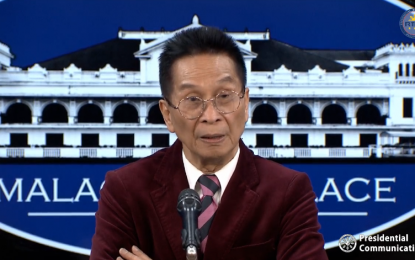
Chief Presidential Legal Counsel Salvador Panelo (File photo)
MANILA – Critics and detractors of the anti-terrorism bill are “cerebrally challenged”, Chief Presidential Legal Counsel Salvador Panelo said on Sunday, saying they were “oblivious” to the consequences of terrorism.
In a statement, Panelo defended the proposed law, stressing that the state needed to have in its arsenal “a law that can respond to the exigencies of the time and neutralize the terrorists’ agenda.”
“The critique against the anti-terrorism bill is not only biased, lacking in intellectual insight and oblivious of the monstrosity and the grave infinitesimal consequences that terrorism has brought to the world,” he said.
Panelo dismissed as “falsehood” the claims of the opposition and some sectors which, according to him, were trying to peddle a “phantom fear” by demonizing the legislation.
He rejected accusations that the bill is intended against the dissenters, pointing out that it specifically stated that terrorism does not include dissent nor protest.
“Industrial or mass action like stoppage of work, and other similar exercises of civil and political rights, like rally or demonstration, not intended to cause death or serious physical harm to a person, or endanger a person’s life, or create a serious risk to public safety, do not fall within the ambit of the anti-terrorism act,” he said.
Panelo also justified the provision in the measure which allows detention to be extended to a total of 24 days compared to the present law allowing a maximum of three days before charges are filed.
“The extended detention is necessary by reason of the potential grave risk that a suspected terrorist is freed immediately prior to his being judicially charged. He could immediately join his fellow terrorists and execute their terror attacks or alert them of the impending moves of the government forces to neutralize them,” he said.
Citing Sen. Panfilo “Ping” Lacson, the author of the bill in the Senate, Panelo explained that the Philippine version of the ani-terror bill had a “much shorter” period of detention than other Southeast Asian countries such as Thailand (30 days); Malaysia (two years); Singapore (720 days); and Indonesia (120 days).
He, however, assured that the discretion to decide to further detain a suspect is removed from the arresting police officer or military personnel by law.
Safeguards
Panelo tagged as “misplaced” criticism that the bill’s Anti-Terrorism Council (ATC) “does not have the training and competence to establish the existence of probable cause” preliminary to the arrest of a suspected terrorist. The ATC is composed of civilians who are members of the Cabinet.
“ATC under the proposed law would have three lawyers, they are Executive Secretary Salvador Medialdea, Foreign Affairs Secretary Teodoro Locsin, Jr., and Justice Secretary Menardo Guevara. Prior to their entry to government service, the three were active law practitioners. Like any judge, they have been schooled and trained to determine probable cause as defined by law. We have therefore three members of the Bar, instead of one, in addition to six other members of the council determining the existence of a probable cause, he said.
He said the ACT will base its findings on “evidence or proof” to convince them that there is reason to believe that the suspect has committed acts defined under the law to be terroristic.
Amid concerns that the measure would allow law enforcement officers to “surveil, record or collect" any private communication or conversation, Panelo said an order from the Court of Appeals must first be obtained.
“There is therefore a judicial determination of a probable cause not only by a Regional Trial Court Judge but by a special division of the Court of Appeals consisting of three Justices,” he said.
After an arrest is made, Panelo explained that law enforcement officers are required to notify in writing the circumstances of the arrest and the physical and mental condition of the detained suspect, in addition to furnishing the Commission on Human Rights (CHR) the written notice given to the judge.
“The constitutional rights of the suspect under detention remain enforced. He has to be informed of the nature of the charge against him; he has to be informed of his right to remain silent; he has right to have a competent and independent counsel of choice, or if he cannot afford the services of a lawyer, the Integrated Bar of the Philippines or the Public Attorneys’ Office is required to provide him legal assistance,” he said.
Finally, he said the detained terrorist suspect can also avail of the extra-legal remedies of the writ of habeas corpus, and writ of amparo and question the legal basis of arrest and detention.
The writ of habeas corpus is a remedy that can be used to secure the release of a person who is being unlawfully detained while a writ of amparo is a remedy available to any person whose right to life, liberty and security has been violated or under threat.
Moreover, the suspected terrorist can also file a petition for bail which the Constitution grants to all persons charged, he said.
Under the anti-terrorism bill, persons who voluntarily and knowingly join any organization, association, or group of persons knowing that such is a terrorist organization, shall suffer imprisonment of 12 years.
Suspected persons can be detained for 14 days without a warrant of arrest with an allowable 10-day extension. A 60-day surveillance on suspected terrorists can also be conducted by the police or the military, with an allowable 30-day extension.
The bill is now up for President Rodrigo Duterte’s signature. (PNA)
